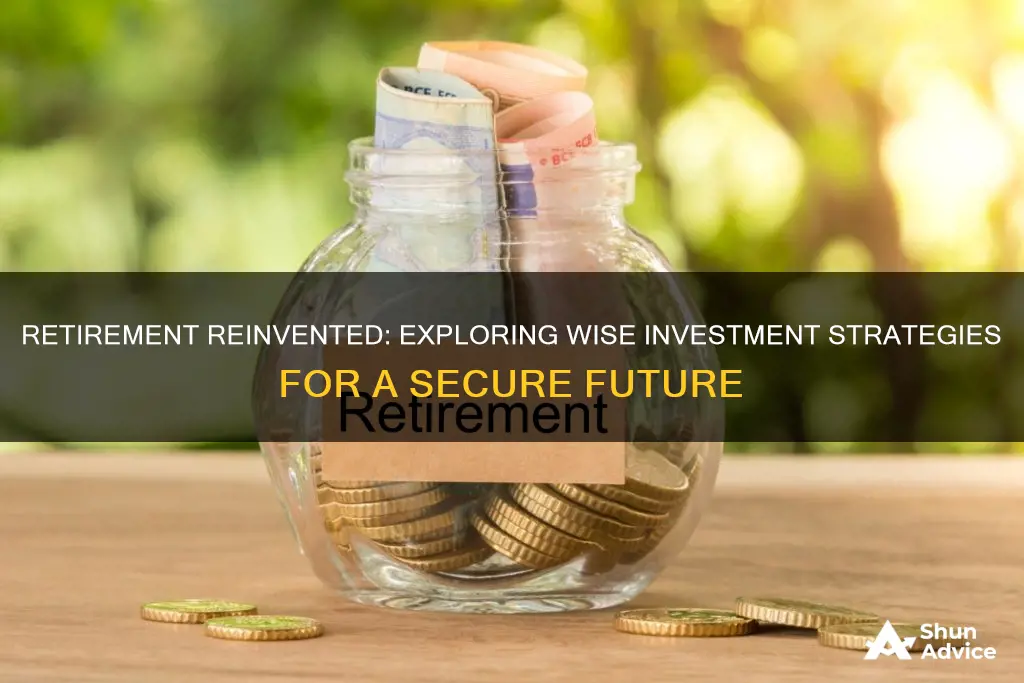
Planning for retirement can be a daunting task, but there are several investment options available to help you generate a stable income during your golden years. Here is a list of some wise retirement investments to consider:
- High-yield savings accounts: These accounts offer higher interest rates than traditional savings accounts, providing easy access to your money while also growing your wealth.
- Long-term certificates of deposit (CDs): CDs are considered safe investments and can provide higher returns than savings accounts. They are ideal for those seeking a guaranteed return without the risk of losing their principal investment.
- Long-term corporate bond funds: Investing in corporate bonds can offer higher returns than government or municipal bonds. While there is a risk of default, investing in a diverse range of high-quality corporate bonds can mitigate this risk.
- Dividend stock funds: Dividend stocks allow you to earn a portion of a company's profits on a quarterly basis. By investing in a dividend stock fund, you reduce your risk by diversifying your portfolio across multiple companies.
- Value stock funds: These funds invest in stocks that are bargain-priced, offering the potential for higher returns as interest rates rise.
- Small-cap stock funds: Small-cap funds focus on investing in smaller companies with strong growth prospects. While they carry more risk than large-cap stocks, the potential gains can be significant.
- Real Estate Investment Trusts (REITs): REITs are a popular way to invest in real estate. They provide diversified exposure to the real estate market and offer both capital appreciation and dividend income.
- S&P 500 index funds: These funds are based on a broad index of large American companies, providing diversified exposure to some of the most successful businesses. They offer higher returns than traditional banking products but come with more volatility.
- Nasdaq-100 index funds: Nasdaq-100 index funds give you access to some of the biggest and best tech companies. While they offer growth potential, they also carry significant volatility due to the high valuation of tech stocks.
- Rental housing: Investing in rental properties can be a great source of regular income if you are willing to manage the properties yourself. However, it requires a significant time and financial commitment.
- Income annuities: Annuities provide a guaranteed income stream, either for a specific period or for life. They offer tax-deferred growth and flexibility in how you save and receive money during retirement.
- Diversified bond portfolio: Bonds offer a stream of income with competitive yields and provide effective diversification to offset the risk in your portfolio. However, they are taxed at ordinary income rates, and there is a risk of principal loss if interest rates rise.
- Total return investment approach: This strategy focuses on generating income through interest, dividends, and capital gains. It aims to meet your immediate cash flow needs while continuing to build savings for the future.
- Income-producing equities: Some stocks, particularly utilities and REITs, offer competitive dividend yields. While stock dividends may fluctuate, they can provide a built-in return on your investment and diversify your retirement portfolio.
| Characteristics | Values |
|---|---|
| High-yield savings accounts | Accessible, FDIC-insured, higher interest rates than traditional banks |
| Long-term certificates of deposit | Higher interest rates than savings accounts, safer investments |
| Long-term corporate bond funds | Higher returns than government and municipal bond funds |
| Dividend stock funds | Cash payout, safer than growth stocks or non-dividend stocks |
| Value stock funds | Safer than other kinds of stock funds, tend to do better as interest rates rise |
| Small-cap stock funds | Attractive long-term returns, significant potential gains |
| REIT index funds | Substantial dividends, potential for capital appreciation |
| S&P 500 index funds | Broad, diversified exposure to the stock market, immediate diversification |
| Nasdaq-100 index funds | Exposure to some of the biggest and best tech companies |
| Rental housing | Regular cash flow, potential for strong performance in 2024 |
What You'll Learn

High-yield savings accounts
One of the benefits of high-yield savings accounts is that they are low risk. These accounts are typically FDIC-insured, which means that your money is protected up to a certain amount per depositor, per account, and per institution. This gives you an extra sense of security for your savings.
When choosing a high-yield savings account, it is important to consider the requirements for opening an account, such as minimum deposit amounts and monthly fees. You should also compare the APYs offered by different financial institutions to get the best rate possible. Additionally, look into the accessibility of the account, including whether there are physical branches or a large ATM network, as well as the usability of their online and mobile platforms.
Some popular high-yield savings accounts include UFB Direct, Credit Karma Money Save, Varo, and My Banking Direct. Each of these accounts offers competitive APYs, low fees, and other features such as ATM access and mobile banking.
Invest Wisely: Property Strategies
You may want to see also

Long-term certificates of deposit
When you open a CD account, you agree to leave your money untouched for a specified period, known as the term or maturity date. This term could be anywhere from 28 days to 10 years, depending on the bank or credit union. In exchange for agreeing to this arrangement, you will typically receive a higher rate of interest than you would with a standard savings account.
CDs are a good option if you are saving for a long-term goal and don't anticipate needing to access the funds until the maturity date. They are also a good option if you are seeking a safe, secure place to keep your savings.
However, it's important to remember that withdrawing money from a CD account before the maturity date is usually subject to an early withdrawal penalty. This penalty can be equal to some or all of the interest you have earned on the account. Therefore, CDs may not be the best option for those who think they may need to access their funds before the maturity date or those seeking more dynamic investment options.
When choosing a long-term CD, it's important to shop around for the best rates and consider the APY, compounding schedule, minimum deposit, term, early withdrawal penalty, and customer experience. It's also a good idea to choose a term that aligns with your financial goals.
Some banks and credit unions offer promotional CD rates to attract new customers. These promotional CDs may offer higher rates than the bank's standard CD offerings, but they may also have specific requirements or stipulations.
Overall, long-term CDs can be a great option for those seeking a safe and secure way to grow their savings over time. Just be sure to do your research and choose a CD that fits your financial goals and needs.
Reliance Industries: Invest Now?
You may want to see also

Long-term corporate bond funds
When considering long-term corporate bond funds as a retirement investment, it's important to understand their characteristics and potential benefits. Here are some key points to keep in mind:
Income Generation: Corporate bonds provide a steady stream of income through regular interest payments. These interest payments can offer a stable source of cash flow during retirement.Risk and Creditworthiness: Long-term corporate bonds typically carry more credit risk than government or agency-backed bonds. It's important to assess the creditworthiness of the issuing corporations to mitigate the risk of default.Diversification: Investing in a fund that holds a diverse portfolio of corporate bonds from different industries and companies can help reduce risk. Diversification ensures that your retirement portfolio is not overly exposed to the performance of a single company or sector.Interest Rate Sensitivity: The value of long-term bonds is influenced by changes in interest rates. When interest rates rise, the price of existing long-term bonds tends to fall, and vice versa. This duration risk can impact the overall performance of long-term corporate bond funds.Tax Considerations: Interest income from corporate bonds is generally taxable, and taxes can affect the overall return on your investment. It's important to consider the tax implications within your specific context.Liquidity: Bond funds offer relatively high liquidity, allowing investors easy access to their money. However, selling bonds before maturity may result in capital gains or losses, depending on the market conditions and the specific bonds held by the fund.Management Fees: Long-term corporate bond funds typically charge management fees, which can vary across different funds. It's important to consider the impact of these fees on your overall investment returns.
Investing for Your Imminent Retirement: Strategies for the Final Stretch
You may want to see also

Dividend stock funds
- Passive Income: Dividend stocks can provide passive income, which is money that comes in with little to no work required. This can be especially beneficial during retirement when individuals may not be actively working.
- Flexibility: Dividend income offers flexibility. It can be reinvested to accumulate more assets, saved into another asset class, or spent as needed during retirement.
- Value Stocks: Stocks that pay dividends are often shares of established companies with steady profits, making them relatively stable and safer options for retirees.
- Income and Asset Growth: Dividend stocks provide both steady income and the potential for asset growth over time. The stock value is likely to rise, offering a double benefit to investors.
- Inflation Hedge: Dividends tend to increase over time, which can help retirement income keep pace with inflation.
- Risk Considerations: While dividend stocks are generally considered safer, individual stocks can still carry risk. It's important to carefully choose dividend investments and consider diversifying across different sectors to minimize risk.
- Tax Implications: Dividends can have tax advantages, such as qualified dividends being taxed at lower capital gain rates. However, there can also be double taxation, with taxes paid by both the corporation and the investor.
- Dividend Policies: It's important to remember that dividend policies can change over time. Companies are not guaranteed to maintain their dividend policies, and there may be fluctuations or eliminations.
Overall, dividend stock funds can be a wise retirement investment option, especially for those seeking regular income during retirement. However, as with any investment, it's crucial to carefully consider the risks, conduct thorough research, and potentially consult a financial advisor before making decisions.
Investments: What's Cheap Now?
You may want to see also

Value stock funds
When it comes to value stock funds for retirement, there are a few different options to consider. One is to invest in a diversified portfolio of value stocks from different sectors and industries. This helps to reduce risk and ensure that your portfolio is not overly exposed to any one particular stock or industry. Another option is to focus on high-dividend value stocks, which can provide a steady income stream in addition to potential capital appreciation.
- Vanguard Equity Income Fund: This fund seeks to provide an above-average level of current income and reasonable long-term capital appreciation by investing mainly in large- and mid-capitalization companies.
- Dodge & Cox Stock Fund: This fund takes a deep-value approach, focusing on fundamental valuation benchmarks such as price-to-earnings and price-to-book ratios.
- Vanguard International High Dividend Yield ETF: This fund invests in global companies outside the US that offer above-average dividend yields, with a focus on high-quality, low-volatility stocks.
- Fidelity Value Factor ETF: This fund seeks out profitable companies with sound growth prospects, respectable balance sheets, and value pricing, with a focus on the technology, healthcare, and financial sectors.
- Schwab Balanced Fund: This fund offers a mix of US and international stocks, as well as US fixed-income assets, with no minimum required investment.
Remember, investing in value stocks can be challenging and requires plenty of research to uncover which stocks are truly undervalued. It's always a good idea to consult with a financial advisor before making any investment decisions, especially when it comes to retirement planning.
Black Investment: Why So Little?
You may want to see also
Frequently asked questions
Safe investments for retirees include high-yield savings accounts, long-term certificates of deposit, and money market funds.
Low-risk, high-return investments for retirees include bank certificates of deposit, high-yield savings accounts, a 60/40 mix of stocks and bonds, and money market funds.
Retirement income funds include the American Funds Tax-Aware Conservative Growth and Income Portfolio, the Schwab Balanced Fund, the Vanguard Wellington Fund, and the Dodge and Cox Income Fund.
Retirement plans include defined contribution plans, traditional pensions, guaranteed income annuities, and the Federal Thrift Savings Plan.
Investments that can help generate retirement income include income annuities, a diversified bond portfolio, a total return investment approach, and income-producing equities.







